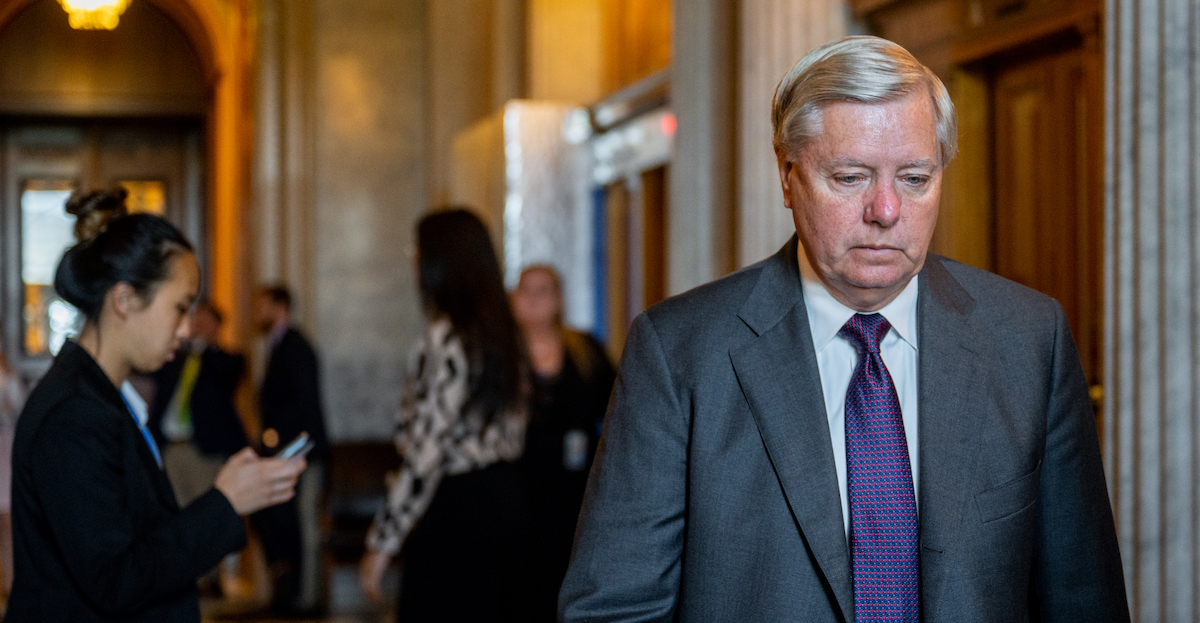
The South Carolina senator walks to a weekly Republican luncheon at the U.S. Capitol on June 22, 2022 in Washington, D.C.
Sen. Lindsey Graham (R-S.C.) is on track to be grilled about what he knows of former President Donald Trump’s efforts to overturn Georgia’s 2020 presidential election results after the U.S. Supreme Court on Tuesday denied a request to quash a subpoena issued by the Fulton County District Attorney’s Office.
Successive federal courts have signed off on the subpoena request. The nation’s high court becomes the latest court do do so.
In September, a federal district handed both sides in the months-long legal dispute a partial victory and loss – ordering Graham to testify before Fulton County District Attorney Fani Willis (D) under the auspices of a special grand jury authorized by a county judge to investigate election subversion efforts by Trump and others.
Meanwhile, U.S. District Judge Leigh Martin May cabined the scope of the questioning available to investigators on the basis of the U.S. Constitution’s speech or debate clause, which generally protects members of Congress from actions taken in their official capacity.
Willis has been trying to obtain Graham’s testimony over several phone calls he made to Georgia Secretary of State Brad Raffensperger (R) and members of his staff in the weeks after the 2020 presidential election. The nature of those calls is disputed. Graham claims they were in service of his duties as a member of the Senate Judiciary Committee. Willis claims Graham was trying to secure a “more favorable outcome” for Trump after he lost the Peach State to President Joe Biden by just shy of 12,000 votes.
Late last month, Justice Clarence Thomas issued an administrative stay, temporarily blocking the subpoena from taking effect.
The high court’s intervention came just a few days after a three-judge panel on the U.S. Court of Appeals for the 11th Circuit was unmoved by arguments from Graham that testifying in the Willis probe would “violate his rights.” Two of the judges on that panel were appointed by Trump himself. One of the judges was appointed by Bill Clinton.
Graham then appealed to the nine justices, by way of Thomas, who handles such requests from the 11th Circuit, asking for a stay until the matter was fully briefed and decided by the full court.
In response to the Thomas pause, Willis argued that a continued stay of the court-ordered subpoena akin to what Graham was requesting would likely mean that the GOP senator would never have to testify due to the limited duration of the special purpose grand jury.
Graham’s attorneys responded to Willis the next day. Brash and resolute, their filing insisted that the speech or debate clause means their client “shall not be questioned” if he doesn’t want to be.
On Tuesday, a majority of justices agreed with the prosecutor, declining to further stay the subpoena.
“The application for stay and an injunction pending appeal presented to Justice Thomas and by him referred to the Court is denied,” a miscellaneous order explains. “The order heretofore entered by Justice Thomas is vacated.”
There were no recorded dissents or concurrences, making it a guessing game to infer how each justice voted on the senator’s request under the rules of what legal scholars call the court’s “shadow docket.”
The court did, however, offer a brief explanation to explain their reasoning in rejecting the stay:
The lower courts assumed that the informal investigative fact-finding that Senator Graham assertedly engaged in constitutes legislative activity protected by the Speech or Debate Clause, U. S. Const. Art. I, §6, cl. 1, and they held that Senator Graham may not be questioned about such activities. The lower courts also made clear that Senator Graham may return to the District Court should disputes arise regarding the application of the Speech or Debate Clause immunity to specific questions. Accordingly, a stay or injunction is not necessary to safeguard the Senator’s Speech or Debate Clause immunity.
Law&Crime reached out to Graham’s attorney Don McGahn, a former Trump White House counsel now working with Jones Day, as well as a representative for Fulton County, for comment on this story. No responses were immediately forthcoming at time of publication.
[image via Brandon Bell/Getty Images]